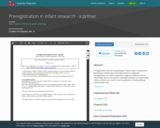
Preregistration, the act of specifying a research plan in advance, is becoming a central step in the way science is conducted. Preregistration for infant researchers might be different than in other fields, due to the specific challenges having to do with testing infants. Infants are a hard-to-reach population, usually yielding small sample sizes, they have a low attention span which usually can limit the number of trials, and they can be excluded based on hard to predict complications (e.g., parental interference, fussiness). In addition, as effects themselves potentially change with age and population, it is hard to calculate an a priori effect size. At the same time, these very factors make preregistration in infant studies a valuable tool. A priori examination of the planned study, including the hypotheses, sample size, and resulting statistical power, increase the credibility of single studies and thus add value to the field. It might arguably also improve explicit decision-making to create better studies. We present an in-depth discussion of the issues uniquely relevant to infant researchers, and ways to contend with them in preregistration and study planning. We provide recommendations to researchers interested in following current best practices.
- Subject:
- Social Science
- Material Type:
- Primary Source
- Author:
- Christina Bergmann
- Sho Tsuji
- Naomi Havron
- Date Added:
- 11/13/2020